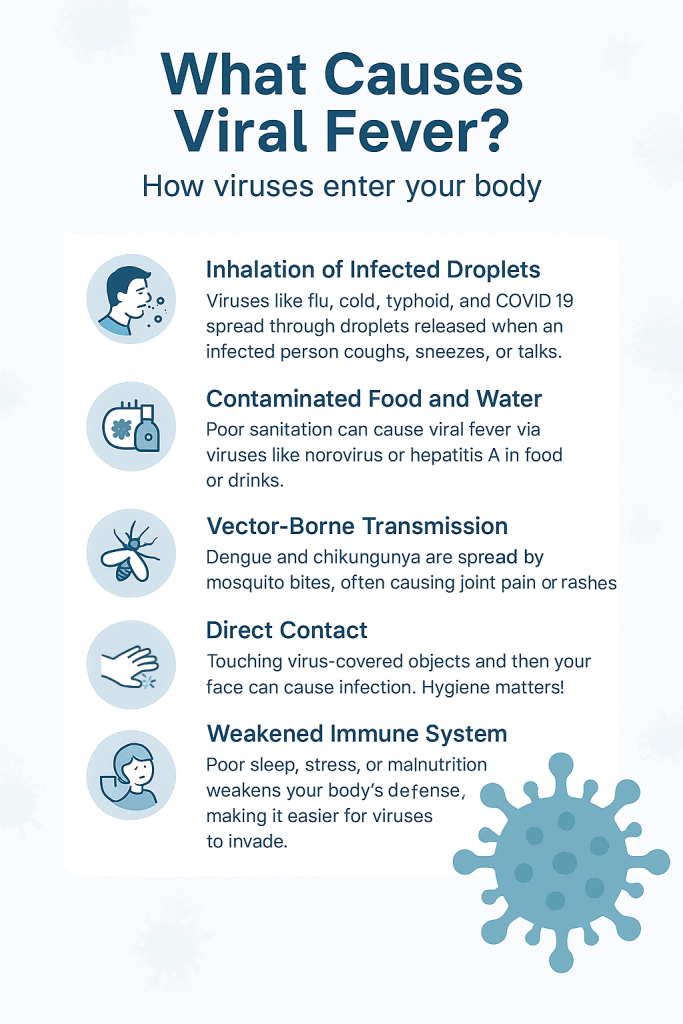Introduction
Have you ever woken up feeling unusually tired, hot, and achy, and then someone casually says, “Oh, it’s probably just a viral fever”? Sounds simple, right? But there’s actually a lot going on behind the scenes when your body spikes a temperature due to a viral infection.
In this blog post, we’re diving deep into the causes of viral fever, its symptoms, how it differs from bacterial infections, and what you can do to recover faster. If you or someone close to you is dealing with a fever and you’re wondering if it might be viral, this guide is for you.
What is Viral Fever?
Let’s start with the basics. What is viral fever? A viral fever is not just one specific illness; it’s actually an umbrella term used for fevers caused by viral infections. These viruses can impact the skin, gastrointestinal system, respiratory system, and other areas of the body. When your immune system detects a virus, it kicks into high gear to fight it off, which results in a higher-than-normal body temperature.
Also Read:- https://karpagamhospital.in/how-to-spot-and-treat-respiratory-infections-a-guide-from-pulmonology-experts/
In other words, the fever is your body’s way of saying, “Hey, something’s not right. I’m working on it!”
Viral fevers can range from mild to severe, and while many people recover at home with some rest and fluids, others—especially children, the elderly, or those with weaker immune systems—might need medical attention.
What Causes Viral Fever?

So, what causes viral fever exactly? The short answer is: viruses. But the way they enter your body can vary.
1. Inhalation of Infected Droplets
Tiny droplets are released into the air when a person with a viral infection coughs, sneezes, or even speaks. If you breathe these in, you could become infected. This is how viruses like the flu, common cold, typhoid and COVID-19 spread.
2. Contaminated Food and Water
Another common route is through contaminated food or drinks, particularly in the case of viruses like norovirus or hepatitis A. In places with poor sanitation, this is one of the leading causes of viral fever.
3. Vector-Borne Transmission
Viruses like dengue or chikungunya are spread through mosquito bites. These fevers often come with very specific symptoms like joint pain and skin rashes.
4. Direct Contact
Touching surfaces that have the virus on them—doorknobs, smartphones, handrails—and then touching your face can also transmit the virus. That’s why hand hygiene is such a big deal!
5. Weakened Immune System
Your immune system acts like a security guard. If it’s compromised (due to stress, poor nutrition, lack of sleep, or other illnesses), viruses find it easier to sneak in and set up shop.
Also Read:- https://karpagamhospital.in/best-foods-to-boost-your-immunity-during-the-rainy-season/
Viral Fever Symptoms
Now let’s talk about what it feels like when you have a viral fever. The following are the typical signs of viral fever, though they can change depending on the virus causing the illness:
- High-grade fever – typically above 100.4°F (38°C)
- Fatigue – feeling tired or drained, even without doing much
- Headaches – dull or throbbing pain, often worsening with movement
- Muscle and joint pain – especially in fevers like dengue
- Chills and shivering – even when the room is warm
- Sore throat or cough – common in respiratory infections
- Nasal congestion or runny nose
- Loss of appetite
- Skin rashes – depending on the virus (e.g., measles, chickenpox)
- Digestive issues – nausea, vomiting, or diarrhea
It’s important to note that these symptoms often overlap with other illnesses, so observing patterns and duration becomes crucial.
Viral Fever Symptoms in Adults vs. Kids
When it comes to viral fever symptoms in adults, most people experience moderate discomfort—body ache, mild headache, and fever—and can usually manage it with rest, hydration, and over-the-counter medications.
But kids are a different story.
In viral fever in kids, symptoms may show up more aggressively:
- High fever that can reach 104°F (40°C)
- Extreme irritability or crankiness
- Lack of appetite
- Vomiting or diarrhea
- Sometimes seizures (febrile convulsions) due to very high fever
Since children can’t always communicate how they feel, even simple symptoms should be taken seriously. Always monitor their temperature and ensure they stay hydrated.
How Long Does Viral Fever Last?
One of the most frequent questions doctors hear is: How long does viral fever last? Generally, a viral fever lasts from 3 to 7 days. The exact duration varies on:
- The type of virus involved
- The individual’s age and immune response
- Whether secondary infections develop
In most cases, you’ll notice the fever breaking by the third or fourth day, followed by a few more days of fatigue. If it lasts longer than a week or the fever keeps coming back, it’s time to consult a healthcare provider.
Difference Between Viral Fever and Bacterial Fever
At first glance, fevers all seem the same—but there’s a big distinction between viral and bacterial ones. Understanding the difference between viral fever and bacterial fever helps in choosing the right treatment path.
| Feature | Viral Fever | Bacterial Fever |
| Cause | Virus | Bacteria |
| Onset | Gradual | Sudden |
| Symptoms | Generalized (fatigue, cough, chills) | Often localized (sore throat, pus, swelling) |
| Medication | Symptomatic (no antibiotics) | Often needs antibiotics |
| Duration | 3–7 days | Can persist longer if untreated |
Getting the right diagnosis is key. Taking antibiotics unnecessarily (for a viral fever) won’t help—and can actually make things worse by causing resistance.
When to Seek Medical Help
While most viral fevers are self-limiting, here’s when you should seek medical care:
- Fever over 102°F lasting more than 3 days
- Breathing difficulties
- Dehydration (dry mouth, no urination)
- Severe headaches or stiff neck
- Rash that worsens or spreads
- Unusual drowsiness or confusion
Don’t hesitate to visit a trusted multispeciality hospital in Coimbatore like Karpagam Hospital, where a team of specialists can accurately diagnose and treat your symptoms.
Tips for Managing Viral Fever at Home
Here are a few simple remedies that can make a big difference:
- Stay Hydrated: Drink water, coconut water, clear broths, or oral rehydration solutions.
- Take Rest: Give your body the time it needs to heal.
- Eat Light Foods: Opt for fruits, khichdi, or soups.
- Use Lukewarm Sponging: Helps control high temperatures.
- Avoid Antibiotics: Unless prescribed, they won’t help for viral infections.
Conclusion
Viral fevers can be widespread, but that does not imply that you should not take them seriously. Identifying the viral fever symptoms, knowing the cause of it, and how to distinguish it from a bacterial fever can be far-reaching in ensuring you or your loved ones recover without hitches.
And remember, if symptoms persist or worsen, don’t self-medicate—visit a trusted healthcare provider.
At Karpagam Hospital, we’re committed to providing quality care for patients of all ages. If you need help managing a fever, we’re just a call away.
FAQs
1. Does Viral Fever Spread?
Yes, it absolutely can. Most viral infections are contagious, which means they can pass from one person to another easily. Coughing, sneezing, sharing utensils, or even touching common surfaces can all spread the virus.
That’s why isolation, hand hygiene, and wearing masks during outbreaks are strongly recommended.
2. Does Viral Fever Cause Weight Loss?
Mild weight loss can happen, especially if you’ve had reduced appetite for several days. But don’t worry—it’s usually temporary. Once you’re back to your normal eating habits and activity level, your weight typically returns to normal.
3. Can Viral Fever Cause Hair Loss?
Interestingly, yes. Some people experience telogen effluvium, a type of temporary hair loss that occurs a few weeks after a high fever or major illness. The good news? It’s not permanent, and hair usually grows back within a few months.
4. Does Viral Fever Cause Stomach Pain?
It can. Especially when the virus affects the digestive system (like in viral gastroenteritis), stomach pain, bloating, and cramps are common symptoms. If you experience sharp pain or notice blood in stools, that could indicate something more serious—and it’s time to get checked.
5. Does Viral Fever Cause Weakness?
Absolutely. Weakness is often the longest-lasting symptom, even after the fever is gone. This post-viral fatigue can linger for days or even weeks, depending on how severe the illness was. Rest, hydration, and nutrient-rich food can help you bounce back faster.
About Karpagam Hospital
Karpagam Hospital is dedicated to healthcare excellence, offering exceptional medical services with compassion and integrity. As a not-for-profit institution, we prioritize ethical medical research and actively support underserved rural communities. Our resources are responsibly managed to enhance education, patient care, and infrastructure, reflecting our commitment to societal and environmental well-being.
Disclaimer:
The information provided in this blog post is intended for general informational purposes only. It is not a substitute for professional medical advice, diagnosis, or treatment. Always seek the advice of your physician or other qualified healthcare provider with any questions you may have regarding a medical condition. Never disregard professional medical advice or delay in seeking it because of something you have read in this blog.








